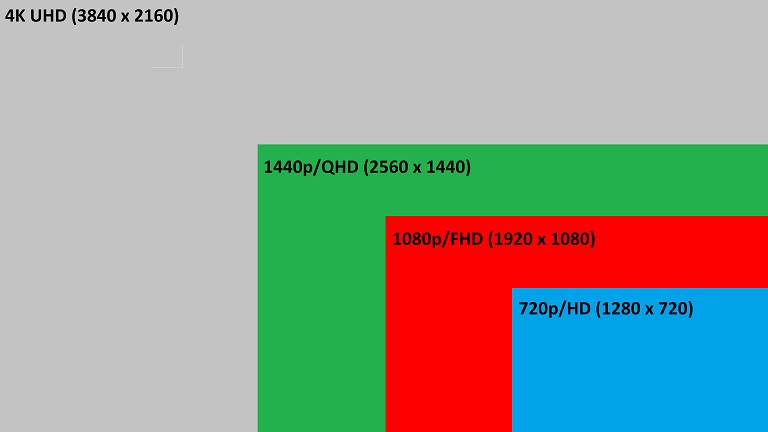Home > Gaming GPUs > Resolutions Explained
Choosing the Best Resolution for PC Gaming
720p vs 1080p vs 1440p vs 4K Comparison and Which Resolution is Most Popular?
 4K is many more pixels than the rest, but that doesn't mean 1080p doesn't have enough pixels to be sharp enough for many
4K is many more pixels than the rest, but that doesn't mean 1080p doesn't have enough pixels to be sharp enough for manyOne of the first things to consider when planning a new gaming desktop build is what resolution you’ll be playing at as it plays a huge role in how powerful of a system you’ll need. For any fresh-faced beginners to the world PCs who may be wondering, what exactly is screen resolution?
Simply put, resolution refers to the amount of pixels rendered on a screen. When you choose a monitor for your gaming PC, you have to decide which resolution monitor you want to get, as while you can change the resolution of a monitor, you ideally want to stick a monitor's native resolution. But why is the screen resolution important in gaming?
Higher resolutions render more pixels on screen, which results in better quality images. This comes at the expense of taxing your computer hardware more, especially your graphics card. The higher the resolution you play at, the more powerful of a gaming computer you'll need to be able to run that resolution at a smooth, playable frame rate.
If your PC is not powerful enough to run a certain resolution, your performance will suffer and you'll see visual slowdowns and stuttering which can get in the way of your enjoyment (or make the game straight-up unplayable).
Plus, as well as needing better PC components for higher resolutions, you’ll also need a monitor that supports that resolution, and high resolution monitors can range from quite a bit more expensive to insanely more expensive. For example, 4K monitors don't come cheap and cost considerably more than say a 1080p (Full HD) monitor.
See Also: How to See Your FPS When Gaming
 4K is the pinnacle of flatscreen PC gaming, but requires a beefy PC to run graphically demanding games at/near 60FPS
4K is the pinnacle of flatscreen PC gaming, but requires a beefy PC to run graphically demanding games at/near 60FPSCommon PC Resolutions Explained
What is 1080p?
1080p, also known as FHD (Full HD) has 1920 x 1080 pixels on-screen and is the common standard these days and the most popular resolution among gamers. In this era of gaming it has the best quality to price ratio. In other words, 1080p/FHD is the sweet spot. If you're on a budget, or looking to get the highest frame-rate possible for use on a high refresh rate monitor such as 120/144Hz, stick with 1080p. It's still a good quality gaming experience.
What is 1440p?
The next step up in resolution from 1080p is called 1440p which is also sometimes referred to as either QHD or WQHD, and has 2560 x 1440 pixels on screen for even higher quality graphics. If you’re wondering, the Q means that it has 4 times (Q = a quarter) the pixels of HD/720p (not to be confused with FHD). As for the W which some people use when referring to it, that simply means Wide as it’s a wide resolution format, however it’s unnecessary to include the W to denote it as a wide resolution because all the resolutions are wide.
1440p takes a more powerful PC to run real well than 1080p, but not by too much in many games, so one day it'll overtake 1080p as the sweet spot. Some will argue these days that 1440p already is the sweet spot, assuming you're not on a super tight budget when building your PC.
What is 4K?
Moving on from 1440p and there’s 4K which is 3840 x 2160 pixels, and also called 4K UHD. Whilst 1440p performance is quite doable if you have a nice amount to spend on your rig (ie over $1000 at the least), 4K is generally not recommended as its requirements are just too high for the average gamer and a decent 4K monitor will cost you a lot.
By all means, opt for a 4K gaming rig if you have the cash to splash, but just know what you’re getting yourself into - especially if you’re a picky gamer and not just wanting playable 4K performance but you’re aiming for a super smooth playing experience in demanding modern titles.
What is 720p?
As for dropping down from 1080p, you have 720p which is also known as HD (1280 x 720 pixels) which used to be the PC standard back in the day, this might be worth considering if you’re building a real cheap entry-level gaming PC build and/or if you don’t mind lower quality graphics. Some games are absolutely fine in lower resolutions such as 720p, and in some eSports titles you'll find some players preferring to sacrifice graphics quality to get a higher, smoother frame rate. For most gamers though, assuming your budget is at least the standard mark of around $400-$500 and higher for your new computer, you should probably just stick with 1080p as it’s very achievable to get good performance in 1080p these days.
What is the Most Popular PC Gaming Resolution?
1080p, 1440p, 4K and poor old 720p are the 4 most popular PC gaming resolutions right now, but which is the most popular resolution these days? Glad you asked.
- #1: 1080p The sweet spot of gaming resolutions right now, as it doesn't take too much CPU and GPU firepower to get good/great performance in 1080p.
- #2: 1440p Whilst 1080p is the most common resolution for PC gaming, 1440p is close on its heels and comes in at the second most popular resolution among gamers right now.
- #3: 4K or 720p It's hard to say what is the third most popular PC gaming resolution, as 1080p and 1440p are clearly the top two, and it's not like we can rally up every PC gamer on the planet to do a poll to find out, but it would have to be either high-end gamers rocking 4K or budget/oldschool gamers who are still using 720p.
After that you have the rarities such as those using a different aspect ratio and resolution of like 900p (hey, if it works for you and your game supports then go for it), and the crazy (smart?) gamers lucky enough to afford a monster $3000-$5000+ gaming monster capable of a mega 8K resolution.
Oh, and keep in mind all this talk about resolutions pertains to standard flatscreen gaming - VR gaming is a whole other beast and the resolutions used by different VR headsets can vary a lot (but these days is usually comparable to 4K, which is one reason why VR is so demanding on GPUs).
Is There a Big Difference in 1080p vs 4K for Gaming?
Simply put, yes. 4K has so many more pixels on screen than 1080p, which makes for a much higher quality image. Of course, this obviously comes at a cost in needing much better hardware, so a high resolution like 4K is out of reach for many PC builders especially if you're on a budget. 1080p and 1440p is absolutely fine these days, and still provide great graphics as there's still a heck of a lot of pixels being rendered in those resolutions. But if you have the cash to splash on your gaming desktop build and you want the most immersive, highest-quality graphics possible, then once you game on a high resolution like 4K it'll be hard to downgrade back to 1080p or so 'cause it's simply beautiful.
Although, deciding which resolution to build your PC for and choosing between 1080p vs 4K (or between 1080p and 1440p, or 1440p and 4K) will also depend on the types of games you play as well. For example, in a game like CSGO, Overwatch, Rocket League, DOTA 2 and League of Legends, where it's mostly about the fast-action gameplay rather than taking in breathtaking landscapes and graphics (glance around for a second in CS and you're bug squash), you could argue that the gaming resolution you're running doesn't matter so much and won't change your overall experience much (if at all) 'cause it's solely about the gameplay.
 The Crysis series in 4K? Worth it if you can afford a good PC. But for a competitive shooter like CSGO? Overkill.
The Crysis series in 4K? Worth it if you can afford a good PC. But for a competitive shooter like CSGO? Overkill.Whereas on the other hand, in slower-paced, more deeper and immersive gaming experiences that have graphics as much a feature as the gameplay such as say, Crysis or The Witcher 3 just to name a couple off the top of my head, higher gaming resolutions make more of a difference on the experience. In other words, it's more appreciated and worth it when compared to other games where you wouldn't notice the difference in graphical detail as much. Just something to think about when choosing the right resolution for your gaming PC.
That wraps up this guide to PC gaming resolutions. If you want recommended parts for different resolutions, see the guide to choosing the best CPU GPU combination which covers exactly that and more.
Trusted VPN
VPN software can be important in this day and age, especially if you do lots of online banking and/or use public WiFi whilst travelling. Having a VPN adds an extra layer of security to your PC or laptop when online to help protect your data, passwords, financials, etc from hackers or malicious programs. It can also let you access region-locked content (eg US Netflix from overseas). For gamers their can be even more benefits to using a VPN.
Because they're so popular these days, there are countless VPN providers, and it can be confusing to pick one. If you want my 2 cents, after a lot of research I decided on NordVPN 'cause it's one of the fastest, most reliable VPNs for both gaming and general use, with a lot of credible reviews out there backing that up. They also quite often run very solid deals.
Popular Articles (see all)
Search the Site
About the Author (2025 Update)
I'm an indie game developer currently very deep in development on my first public release, a highly-immersive VR spy shooter set in a realistic near-future releasing on Steam when it's ready. The game is partly inspired by some of my favorites of all time including Perfect Dark, MGS1 and 2, HL2, Splinter Cell, KOTOR, and Deus Ex (also movies like SW1-6, The Matrix, Bladerunner, and 5th Element).
Researching, writing, and periodically updating this site helps a little with self-funding the game as I earn a few dollars here and there from Amazon's affiliate program (if you click an Amazon link on this site and buy something, I get a tiny cut of the total sale, at no extra cost to you).
Hope the site helps save you money or frustration when building a PC, and if you want to support the countless hours gone into creating and fine-tuning the many guides and tutorials on the site, besides using my Amazon links if purchasing something, sharing an article on socials or Reddit does help and is much appreciated.

